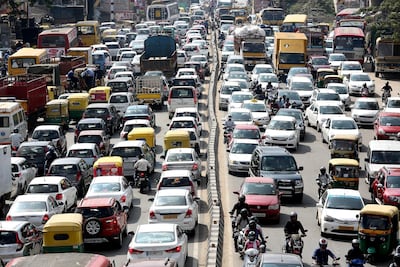When Sathya Sankaran was named Bengaluru’s first Bicycle Mayor last week, he accepted the honour, naturally enough, by cruising up to the stage on his bike.
Mr Sankaran, a 42-year-old activist for civic rights, was conferred the title as part of a global campaign by ByCS, a Dutch non-profit that aims to convert half of all urban transport in the world to bicycle traffic by 2030. The bicycle mayors it appoints work on a voluntary basis to raise support for cycling.
Bengaluru becomes the Indian third city to get a bicycle mayor after Vadodara and Guwahati, but presents the greatest challenge for aspiring cyclists.
As its importance to India’s tech industry has grown and its population has soared past 8 million, Bengaluru's roads have become perpetually choked with traffic. In the mornings and evenings, when company buses shuttle employees to IT parks in the suburbs, it is not uncommon to spend hours in transit. Little space remains for cyclists to travel safely — a shame, given that the city’s crisp, cool weather is ideal for cycling.
India’s 2011 census showed that nearly half of all Indian households owned cycles. But in the cities their use is restricted largely to the poor, and carries a high risk. India’s ministry of road transport recorded 2,585 cyclist deaths in road accidents across the country in 2016.
Mr Sankaran has already spent a decade trying to get people in Bengaluru on to cycles. In the past four years he has organised more than 300 “cycle days” in different of areas of the city, when residents are urged to use cycles rather than motor vehicles.
"If you and your neighbourhood run these cycle days, then you might buy in to cycling, or into how to make the city friendly to cyclists, or how to make cycling enjoyable," he told The National.

At the moment, some residents who want to cycle are put off by the risk. Varun Rajiv and his wife bought cycles in 2013. The lawyer says he planned to use his cycle for medium-distance commutes, and partly as a way to "get fitter and be environmentally conscious", but soon realised that traffic made the enterprise dangerous.
“Especially at night, you have a load of motorcycles without their lights on zipping around, and they’re liable to clip me,” he said. “It can be scary, which is the main reason my wife doesn’t cycle any more.”
Mr Rajiv now uses his bicycle for light exercise on a few mornings each week.
Mr Sankaran said there needed to be a change in the attitude of other road users towards cyclists. “The mindset change comes from the idea that roads need to be shared. They’re a common space,” he said.
The efforts of Mr Sankaran and other cycling advocates are now being supported by city officials. Bengaluru's department of urban land transport announced last week that 400 cycle parking hubs would be set up around the city in the next six months. At the same time, 125 kilometres of bicycle lanes will be marked off.
At least three companies are also rolling out bicycle sharing apps, so that "one can quickly exit a metro station and take a cycle," Mr Sankaran said.
He has experienced some success in persuading people to use cycles. At one school, the number of students using bicycles went up from 1 to 27; at another, from 5 to 45. “This has to be repeated again and again.”
He hopes to use his two-year "mayoral" term to convince more people to make the switch.
“The point is: suppose you leave your doorstep and you’re faced with two choices — a car and a bicycle — how many times do you make the choice of getting on a bike?” he said. “What drives you in your decision? We have to find this and change it.”

